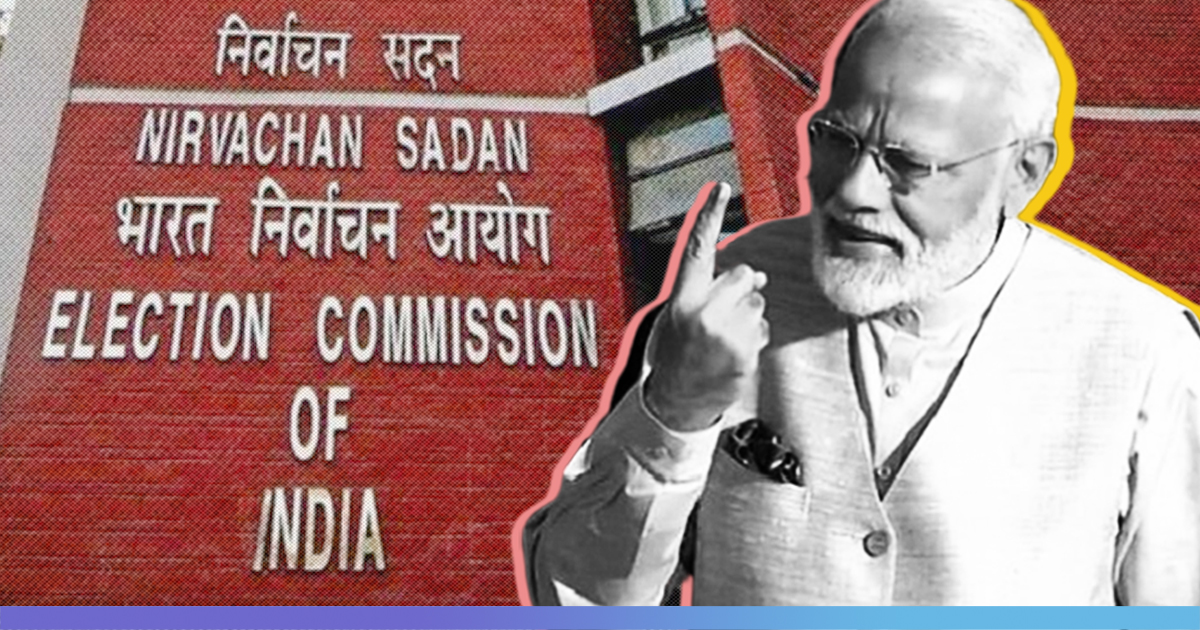
"Can You Dedicate Your Vote To Balakot Airstrike?” EC Says PM's Remarks Does Not Violate Model Code
2 May 2019 12:29 PM GMT
Editor : Sumanti Sen
Sumanti Sen is an English Literature graduate who believes "there's just one kind of folks. Folks.".
Last month, Prime Minister Narendra Modi in his speech in Latur urged first-time voters to dedicate their votes to the soldiers who were martyred in the Pulwama attack and the heroes of the Balakot sir strikes. Although this created outrage, the Election Commission (EC) on May 1 concluded that this was not a violation of its instructions on not involving the armed forces in poll campaigns.
“The matter has been examined in detail in accordance with the extant advisories, provisions of the Model Code of Conduct and after examination of complete transcript of speech of 11 pages as per the certified copy sent by the Returning Officer, Osmanabad parliamentary constituency. Commission is of the considered view that in this matter no such violation of the extant advisories/provisions is attracted,” the commission said, referring to the Prime Minister’s statement in Latur.
Clean chit to Modi
On April 9, Narendra Modi while addressing a rally in Ausa in Maharashtra’s Latur had said, “I want to tell the first-time voters: can your first vote be dedicated to the veer jawans [valiant soldiers] who carried out the air strike in Pakistan. Can your first vote be dedicated to the veer shaheed [brave martyrs] of Pulwama [terror attack].”
Following this incident, local poll authorities in Madhya Pradesh told the Election Commission that Narendra Modi’s remark violated its orders asking political parties to not refer to the achievements of the armed forces as part of their political propaganda.
“… Parties/candidates are advised that their campaigners/candidates should desist, as part of their election campaigning, from indulging in any political propaganda involving activities of defence forces,” the commission had said on March 19. A response was sent to the party since the Congress approached the Election Commission in this regard.
This time, however, the Commission had to go against the Maharashtra Chief Electoral Officer’s (CEO) opinion. It also went against the opinion of the Osmanabad District Electoral Officer (DEO), reported The Indian Express. According to both of them, the remark that Modi made was “inconsistent” with the instructions that the poll watchdog had laid down.
A long debate was held on this opinion at the Commission meeting, following which it was overruled on the grounds that Modi had not sought votes for himself or his party while he invoked the Balakot air strikes. An EC official said that the opinions of the CEO and DEO were not taken into consideration as they were based on “just five lines of the speech”.
On April 30, Tuesday, the Election Commission also claimed that Narendra Modi, in his speech in Wardha on April 1, had not violated the model code of conduct when he slammed Rahul Gandhi for contesting from Wayanad. Modi had also indicated that their were more voters from the Kerala constituency from the minority community. He had accused the Opposition Congress of hurting the sentiments of the country’s Hindus by coming up with the term “Hindu Terror”.
According to EC officials, elections commissioners “examined in detail in accordance with the extant guidelines and provisions of the Model Code of Conduct, the Representation of the People Act, 1951 and the report of the Chief Electoral Officer, Maharashtra”, however, no such violation could be found.
In a similar incident, Madhya Pradesh Chief Minister Kamal Nath’s remarks on defence forces were also found to be not violative of the model code. Addressing a rally at Harsud in Madhya Pradesh’s Khandwa district on April 14, Kamal Nath had attacked Modi and said that the country’s defence forces were built by Jawaharlal Nehru and Indira Gandhi even when Modi was a child.
The Model Code Of Conduct is a set of guidelines which regulate political parties and its candidates to ensure free and fair polls. The Election Commission derives its powers from Article 324 of the Constitution which allows it to monitor the central and state governments as well as the political parties and their candidates.The MCC provisions deal with a myriad of issues ranging from speeches, management of elections, polling booths, portfolios, the content of election manifestos, among others.
Also Read: Instances Of Political Parties Violating Or “Almost Violating” The Model Code Of Conduct
 All section
All section













